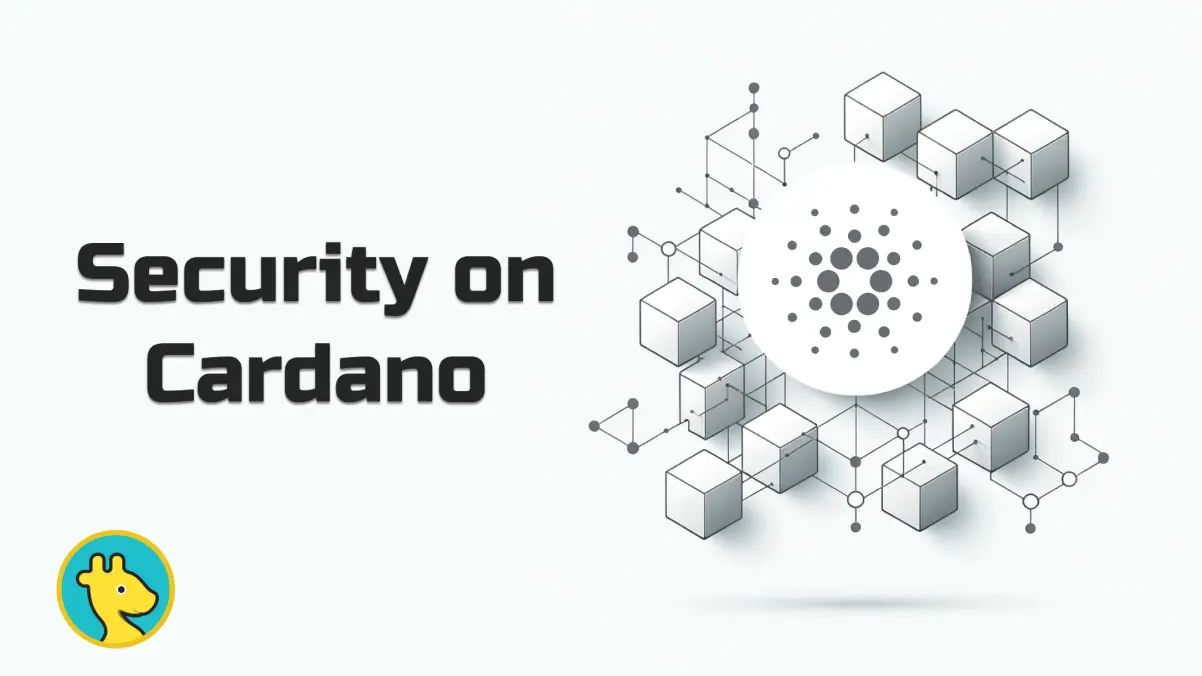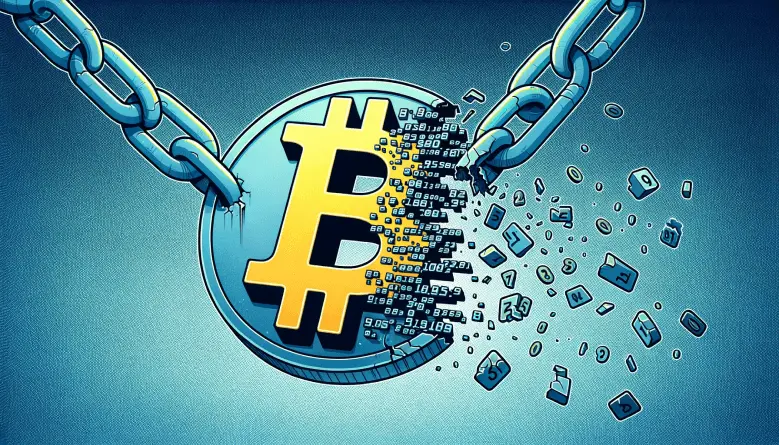Security on Cardano: How the Platform Ensures Data Integrity and User Safety
![]() Sarah Rodriguez • 27 Oct 2023
Sarah Rodriguez • 27 Oct 2023

In the rapidly evolving world of blockchain technology, Cardano stands out as a prominent platform, designed with a unique approach to scalability, sustainability, and security.
Founded on research-driven methodologies and rigorous academic insights, Cardano seeks to address the challenges faced by contemporary blockchain systems. Its commitment to innovation and excellence has positioned it as a front-runner in the crypto sphere.
However, as the adoption of cryptocurrencies grows, so does the emphasis on security. In a digital landscape where threats are ever-evolving, the significance of robust security mechanisms cannot be understated.
Security in the blockchain and cryptocurrency space is not just about safeguarding assets; it's about ensuring data integrity, fostering trust, and building a resilient ecosystem that can withstand potential threats. Cardano, recognizing this imperative, has consistently prioritized the safety of its users and the integrity of its network.
Historical Context

In the volatile landscape of the crypto world, security breaches have left indelible marks. From the infamous Mt. Gox hack, where nearly 850,000 bitcoins vanished, to Ethereum's DAO attack that saw a loss of $50 million, the repercussions have been profound. Another startling event was the Coincheck heist, where hackers spirited away NEM tokens worth over $530 million.
These incidents, while devastating, shaped the crypto sphere's approach to security. Detailed reports shed light on the aftermath of these breaches, highlighting the vulnerabilities faced by digital assets and their host platforms. Beyond the financial implications, these breaches eroded trust in this budding technology.
This backdrop sets the stage for Cardano's inception. Cardano aimed to craft a blockchain ecosystem that seamlessly blends security and functionality. By dissecting past security pitfalls, Cardano's team envisioned a platform resilient to the challenges that haunted its predecessors. Their mission? Crafting a robust Cardano, shielded from the security pitfalls of yesteryears.
Foundational Security Principles of Cardano
When it comes to establishing the bedrock of its security, Cardano stands distinctively apart from other blockchain platforms. Here's how:
Peer-reviewed research as a cornerstone
At the heart of Cardano's security framework is its steadfast commitment to peer-reviewed research.
Instead of relying solely on conventional wisdom or prevailing industry standards, Cardano ensures that every element of its blockchain undergoes rigorous scrutiny by experts in the field. This meticulous approach ensures that the platform is built on principles that have been critically examined and validated by the academic community.
Formal methods and rigorous academic approach to protocol design
Beyond just peer-reviewed research, Cardano adopts formal methods in its protocol design.
Formal methods refer to the use of rigorous mathematical models to verify the correctness of software and hardware systems. This approach is especially crucial in environments like blockchain, where security and data integrity are paramount.
By employing formal methods, Cardano ensures that its protocols are not only theoretically sound but also practically secure.
Ouroboros: The Heart of Cardano's Security

Cardano's strength in security is deeply intertwined with its consensus protocol, Ouroboros. Let's unravel its intricacies:
Overview of the Ouroboros protocol
Ouroboros is more than just a consensus mechanism; it's a testament to Cardano's dedication to creating a secure yet efficient blockchain.
Designed after years of research, Ouroboros is the engine that powers Cardano, ensuring that transactions are processed, and new blocks are added to the chain with utmost integrity. Those keen on understanding the technical underpinnings can refer to Cardano's official documentation on the Ouroboros protocol.
How it ensures data integrity and consensus without compromising on energy efficiency
In the blockchain world, achieving consensus without excessive energy consumption is a monumental challenge.
Ouroboros addresses this by employing a proof-of-stake mechanism, a departure from the energy-intensive proof-of-work systems used by many other cryptocurrencies. Through this method, Cardano not only ensures data integrity but also paves the way for a more sustainable blockchain ecosystem.
The journey of Ouroboros: Evolution and its various versions (Classic, Praos, Genesis)
From its inception as Ouroboros Classic to its current advanced iterations like Ouroboros Praos and Ouroboros Genesis, the journey of Ouroboros has been one of continuous evolution and improvement. Each phase has bolstered Cardano's security and efficiency, solidifying its place as a formidable blockchain platform.
Smart Contract Safety
In the realm of blockchain technology, smart contracts serve as automated, self-executing contracts where the terms of agreement or conditions are integrated directly into the code.
The role of Plutus and Marlowe in creating secure smart contracts
Cardano, in its pursuit of security and reliability, has pioneered two platforms specifically for smart contract development: Plutus and Marlowe. These platforms aren't just about developing smart contracts; they symbolize Cardano's dedication to laying down a secure foundation for decentralized applications.
For a deeper dive into how Plutus and Marlowe are redefining the world of smart contracts, you might find our article on the Era of Plutus and Marlowe enlightening.
Mechanisms to prevent common smart contract vulnerabilities
With the increasing incidents of security breaches in the blockchain space, Cardano has fortified its defenses against vulnerabilities targeting smart contracts. Multiple layers of security checks, combined with rigorous testing environments, ensure that the smart contracts on Cardano are resistant to frequent vulnerabilities.
Notably, the platform utilizes mechanisms like the Verifiable Random Function (VRF) for selecting slot leaders, making it challenging to predict but verifiable on who gets this role. This unpredictability is crucial in preventing DDoS attacks. Additionally, Cardano employs a collateral system, where ADA has to be pledged as collateral during transactions, compensating node operators in case of transaction failures. However, these failures are rare, with the protocol designed to handle large transaction volumes efficiently.
User Safety Measures
In the expansive realm of blockchain and digital currencies, the safety of users is pivotal. Cardano, with its advanced infrastructure, prioritizes user security above all else. To understand this in-depth, let's explore the safety measures put in place by Cardano:
Cardano's Wallet Architecture and its Security Features
Cardano's wallet architecture is not only user-friendly but also fortified with cutting-edge security features. With layers of encryption and advanced cryptographic measures, it assures the users that their assets are in safe hands.
Multi-Signature Transactions and Their Role in Enhancing User Safety
Within the Cardano ecosystem, multi-signature transactions play a crucial role. By mandating validations from multiple entities, it ensures that users' assets remain secure even if one private key is compromised.
Hardware Wallet Integrations and Support
As an added layer of security, Cardano offers seamless integration with top-tier hardware wallets. This allows users to store their private keys offline, shielding their assets from online vulnerabilities.
To understand how these safety protocols align with the broader vision of Cardano, it's worth exploring Cardano's governance model. This offers a comprehensive view of Cardano's commitment to creating a secure yet decentralized ecosystem.
Network and Infrastructure Security in Cardano
Blockchain platforms, while offering transformative solutions, are not immune to threats. As cyberattacks grow in sophistication, the importance of network and infrastructure security in blockchains like Cardano cannot be overstated. Cardano's approach to these challenges showcases its commitment to creating a resilient and secure ecosystem.
Measures to Prevent Sybil Attacks and DDoS Attacks
Sybil attacks, where a single adversary controls multiple nodes in a network to subvert its functionality, pose a significant threat to decentralized systems. To counteract this, Cardano has implemented a unique Proof-of-Stake (PoS) mechanism. This mechanism ensures that the influence a node has on the validation of transactions is proportional to its stake, thereby making it economically unfeasible for an attacker to control a majority of the network.
Distributed Denial of Service (DDoS) attacks, on the other hand, aim to overwhelm a network with a flood of internet traffic. Cardano's decentralized nature inherently offers resistance against such attacks. By distributing its transaction and validation processes across a vast number of nodes, Cardano ensures that incapacitating a few nodes doesn't cripple the network. Additionally, the platform has mechanisms in place to identify and isolate malicious nodes, further bolstering its defense against DDoS attacks.
Stake Pool Operations and Their Role in Maintaining Network Security
Stake pools play a pivotal role in Cardano's security framework. These are community-run nodes responsible for processing transactions and producing new blocks. By decentralizing the block production process across multiple stake pools, Cardano not only enhances network performance but also ensures that no single entity has undue influence over the network.
Stake pool operators are incentivized to maintain the highest security standards. The rewards they receive are directly tied to their performance, which includes uptime, reliability, and the overall security of their operations. This creates a system where the best-performing and most secure stake pools are rewarded, ensuring a continuously secure and efficient Cardano network.
In conclusion, Cardano's approach to network and infrastructure security is holistic. By anticipating potential threats and designing mechanisms to counteract them, Cardano has established itself as one of the most secure blockchain platforms in the industry.
Interoperability and Security in Cardano
In today's blockchain landscape, the concept of interoperability, or the ability for different blockchains to communicate and collaborate, has emerged as a pivotal feature. While this interconnectedness paves the way for a more unified blockchain ecosystem, it also introduces complex security challenges. Cardano, ever-evolving in its approach, has been at the forefront of addressing these challenges, ensuring that its cross-chain operations remain both efficient and secure.
Challenges of Ensuring Security While Interacting with Other Blockchains
The allure of interoperability comes with its own set of security concerns. When disparate blockchains attempt to communicate, they inadvertently expose themselves to potential vulnerabilities present in each chain. The key challenges include:
- Mismatched Security Protocols: Every blockchain boasts its own unique set of security protocols. When these blockchains communicate, there exists the latent risk that the weaker security protocols of one could be exploited, endangering the integrity of the other.
- Inherent Complexity: Combining the distinct consensus algorithms, validation rules, and transaction formats of different blockchains increases complexity. This intricacy could inadvertently create vulnerabilities that malicious entities can exploit.
- Data Integrity Concerns: A primary concern is ensuring that data moving between chains retains its integrity and remains free from tampering.
Cardano's Solutions for Safe Cross-Chain Transactions
Anticipating the challenges posed by interoperability, Cardano has innovatively developed several strategies:
- Interledger Protocols: Cardano's use of interledger protocols enables seamless transactions between different blockchains without needing a central intermediary. This approach not only encapsulates the decentralized essence of blockchain but also offers added security.
- Smart Contracts: The smart contracts in Cardano are crafted to support secure cross-chain interactions. These contracts establish conditions that both participating chains must fulfill before validating a transaction, ensuring that neither is exposed to undue risks.
- Formal Verification: To guarantee that cross-chain transaction codes operate as intended, Cardano adopts formal verification methods. This rigorous mathematical approach to code verification minimizes errors and vulnerabilities.
Cardano's commitment to achieving interoperability without compromising on security is a testament to its progressive vision. As one traces the evolutionary trajectory of Cardano, from its initial phases to its current state, it becomes evident how the platform has adeptly navigated the challenges of the blockchain domain. For a deeper understanding of this evolution and the strategic decisions that have shaped Cardano's journey, you might want to explore the detailed analysis in our article on the evolutionary journey of Cardano's development phases.
Education and Community Engagement in Cardano
The realm of blockchain and cryptocurrencies is as vast as it is intricate. For many, it can be a daunting challenge to navigate its complexities, especially when it comes to security concerns. Recognizing this, Cardano has made significant strides in not only developing advanced security measures but also ensuring that its community is well-educated and actively engaged in maintaining the platform's security.
Cardano's Initiatives to Educate Users and Developers

Cardano understands that the first line of defense in any system's security is its users. Therefore, they've taken several steps to ensure that both casual users and developers are well-versed in security best practices:
- Educational Webinars and Workshops: Regular sessions are conducted to educate participants about the latest security protocols, potential vulnerabilities, and ways to safeguard their assets and data.
- Resource Libraries: Cardano offers a comprehensive library of resources, including articles, video tutorials, and guides that delve deep into security protocols, helping users and developers understand and implement best practices.
- Development Training: Recognizing the crucial role developers play in the ecosystem, Cardano provides specialized training programs. These programs ensure that dApps and other Cardano-based solutions are developed with security at their core.
The Role of the Cardano Community in Security
The Cardano community, diverse and expansive, is one of the platform's greatest assets. Their active participation has been instrumental in identifying potential vulnerabilities and suggesting solutions:
- Open Source Vigilance: Being an open-source platform, Cardano benefits from the collective scrutiny of its codebase by developers worldwide. This collective vigilance ensures that potential vulnerabilities are quickly spotted and addressed.
- Community Forums: Forums and discussion platforms foster an environment where users can share their concerns, discuss potential threats, and collaboratively find solutions. These platforms act as a real-time feedback loop, helping Cardano stay ahead of security challenges.
- Bug Bounty Programs: To encourage the identification of potential vulnerabilities, Cardano often runs bug bounty programs. These incentivize the community to actively seek out and report vulnerabilities, ensuring a more secure environment.
Cardano's dedication to education and its active engagement with the community underscores its commitment to creating a secure and inclusive blockchain ecosystem. For those keen on diving into the community's discussions on security or looking to participate actively, Cardano's community forums serve as a hub where insightful security discussions and threat identification take place.
Future Security Developments and Innovations in Cardano
Cardano, renowned for its scientific approach to blockchain, has continually shown dedication to being at the forefront of security in the crypto world. As the digital space evolves, so do the challenges. Cardano's forward-thinking approach ensures that they not only adapt but also preemptively address potential future threats.
Upcoming Security Upgrades and Features on Cardano's Roadmap
Cardano has a well-outlined roadmap that highlights its commitment to ongoing development, especially concerning security:
- Enhanced Wallet Security: Cardano plans to introduce further layers of encryption and biometric authentication features for its wallet users, ensuring that user funds remain inaccessible to unauthorized individuals.
- Advanced Smart Contract Protocols: As the era of smart contracts on Cardano evolves, there will be continuous upgrades to the Plutus and Marlowe platforms to ensure they remain resistant to vulnerabilities.
- Improved Network Resilience: Cardano aims to further decentralize its nodes, making the network even more resistant to targeted attacks and potential centralization vulnerabilities.
Research Areas and Innovations for Cardano's Security
Innovation is at the heart of Cardano's philosophy. Their research-driven approach ensures that they remain ahead of the curve:
- Quantum Resistance: One of the future threats to blockchains and cryptographic systems, in general, is quantum computing. Cardano is actively researching post-quantum cryptographic algorithms to ensure the platform remains secure even when quantum computers become mainstream.
- Artificial Intelligence and Machine Learning: Cardano is exploring the integration of AI and ML to detect unusual patterns in transactions, potentially flagging malicious activities before they can harm the network.
- Interoperability Protocols: As Cardano seeks to become more interoperable with other blockchains, ensuring secure cross-chain transactions is paramount. Research in this area will ensure Cardano remains a leader in secure blockchain interoperability.
Conclusion
Cardano's journey in the realm of blockchain has always been marked by its unwavering commitment to security. Their research-first, community-driven approach ensures that they continually evolve, addressing current challenges while also looking to the future. As the blockchain landscape grows and transforms, Cardano stands firm in its mission: to be not only one of the most innovative but also one of the safest blockchain platforms in the world. The road ahead is long, but with Cardano's dedication and the collective strength of its community, the future looks promisingly secure.
FAQ
What sets Cardano apart in the blockchain world?
Cardano is distinguished by its research-driven methodologies, rigorous academic insights, and a unique approach to scalability, sustainability, and security.
How has Cardano learned from past security breaches in the crypto space?
Cardano was designed with insights from past security breaches like the Mt. Gox hack and Ethereum's DAO attack. By dissecting these past pitfalls, Cardano seeks to build a resilient platform shielded from similar issues.
What is the significance of peer-reviewed research in Cardano's security framework?
Peer-reviewed research ensures that every element of Cardano's blockchain undergoes rigorous scrutiny by experts, ensuring it's built on principles that have been critically validated by the academic community.
How does Ouroboros contribute to Cardano's security?
Ouroboros is Cardano's consensus protocol, ensuring data integrity and consensus without excessive energy consumption. It has evolved through various versions, each enhancing Cardano's security and efficiency.
What measures has Cardano taken to ensure secure smart contracts?
Cardano introduced platforms like Plutus and Marlowe for secure smart contract development. They've also implemented multiple layers of security checks and rigorous testing environments.
How does Cardano prioritize user safety?
Cardano focuses on features like encrypted wallet architecture, multi-signature transactions, and integration with hardware wallets to ensure user safety.
How does Cardano counteract network threats like Sybil and DDoS attacks?
Cardano uses a unique Proof-of-Stake (PoS) mechanism to prevent Sybil attacks and its decentralized nature to counteract DDoS attacks.
How is Cardano addressing the security challenges of blockchain interoperability?
Cardano uses interledger protocols, secure smart contracts, and formal verification methods to ensure safe cross-chain transactions.
What role does the Cardano community play in platform security?
The community participates in open-source code reviews, discussion forums, and bug bounty programs, actively identifying potential vulnerabilities and suggesting solutions.
Where can I exchange Cardano?
If you want to exchange Cardano, you are in the right place. You can swap Cardano limitlessly using Exchang.io crypto exchange.
Disclaimer:
The information contained in this article is provided for educational and informational purposes only. It is not intended to be investment or financial advice, and should not be taken as such. Cryptocurrency is a highly speculative and volatile market, and any investment made in it carries a significant risk. Before making any investment decisions, it is recommended that you seek the advice of a qualified financial professional to understand the potential risks and rewards associated with investing in cryptocurrencies.
